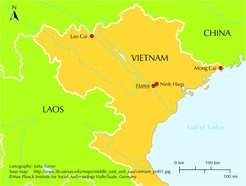Traders, Markets, and the State in Vietnam

Researchers:
Kirsten Endres
Head of Research Group
Small Trade, State Regulation, and Social Exchanges at the Vietnam-China Border
Caroline Grillot
Research Fellow
Differences in perceptions of business ethics between Chinese and Vietnamese trading partners (Móng Cái city, Vietnam)
Lisa Barthelmes
Ph.D Candidate
Peasants or Peddlers? Mobile Street Vendors in Hanoi, Vietnam
Esther Horat
Ph.D Candidate
Market Transformation and Trade Dynamics in Northern Vietnam: The Case of Ninh Hiep
(Former group member)
Christine Bonnin
Research Fellow
New Markets in Upland Culture: State Development Directions and Ethnic Minority Traders in the Northern Borderlands of Vietnam
Point of Departure
Within the current context of neoliberalism and global market integration, extensive evidence points towards the resilience and growth – and not the decline and extinction as predicted – of small-scale trade in local markets and diverse sites of the so-called informal economy. In Vietnam, local marketplaces continue to fulfill an enduring, vital role in the daily lives and livelihoods of the majority of residents, and particularly so for lower income groups.
This research group seeks to investigate the complex, entangled webs of social ties, state structures and discourses, and economic forces in which the lives of market vendors and street traders are situated. Our approach rejects a view of culture as distinct from economy. Instead, we look at how contemporary neoliberal economic ideologies and associated ‘open market’ policies interact with the everyday economics of small-scale traders in the socialist setting of Vietnam.
Cultural and Historical Background
During the state-planned economy, private trade was stigmatized as unproductive and tolerated only as a means of survival and not ‘selfish’ profit - although it was never entirely eliminated. In the decade and a half since Vietnam’s turn to a market economy ‘with socialist orientation’, marketplaces and small-scale trade have become an ubiquitous, legitimate, viable, and sometimes necessary, means of income for many. Market buildings are renovated and now overflow with commodities reflecting new consumption trends. The reopening of cross-border trade with China as of the early 1990s has also expanded flows of goods and people across the border.
Concurrently, state economic agendas increasingly marginalise ‘traditional’ forms of commercial activity in the name of development and modernisation. New trade centres conforming to modern standards of hygiene, aesthetics, and product quality replace outdoor markets and street peddling. Small trade now represents a backwards, undisciplined economy that thwarts state efforts to implant 'modernity' through rational economic development.
Research Aim
This research group takes Vietnam’s everyday marketplaces as its main focal point for investigation and analysis. Our overall aim is to shed light on the dynamics of Vietnam’s ongoing transition to a market-based economy at the micro-level, by examining how these processes are being experienced and negotiated by ‘ordinary people’. Local markets are conceptualised here not simply as places where buying and selling activities take place, but also as contested social spaces in which a number of big and small power struggles are being played out. Our programme engages with the following key research themes:
- local-level economic agency in negotiating state regulation and policies in the ‘development’ and modernisation of markets
- the social support networks, moral principles, and gender dynamics underpinning small-scale trade activities
- the frontier area particularities of small, cross-border trade between Vietnam and China
- upland trade, 'cultural markets' and the commodification of upland minority culture
Specific Research Projects
Linked to the core themes outlined, different research projects will be carried out in various local, social-cultural and ethnic settings throughout north Vietnam. Our results seek to fill a significant gap in Vietnamese economic studies and contribute fresh insights and perspectives to the ongoing interdisciplinary debate on the embeddedness of ‘the market’ in a late socialist society. Individual projects and settings include:
- Changes and continuities in rural trade dynamics within historical ‘trade villages’ (Horat - Ninh Hiep, Hanoi).
- The everyday trading experiences of mobile street vendors in Hanoi and their interactions with representatives of the state in the context of contemporary discourses on ‘modernization’ and ‘civilization’ (Barthelmes - Hanoi).
- Transnational trade practices over time in markets in the Sino-Vietnamese borderlands (Endres - Lao Cai and Mong Cai).
- The role of ‘cultural marketplaces’ in the lives and livelihoods of ethnic minorities, and as conceptualized by the state, in the northern border uplands (Bonnin - Lao Cai province).
